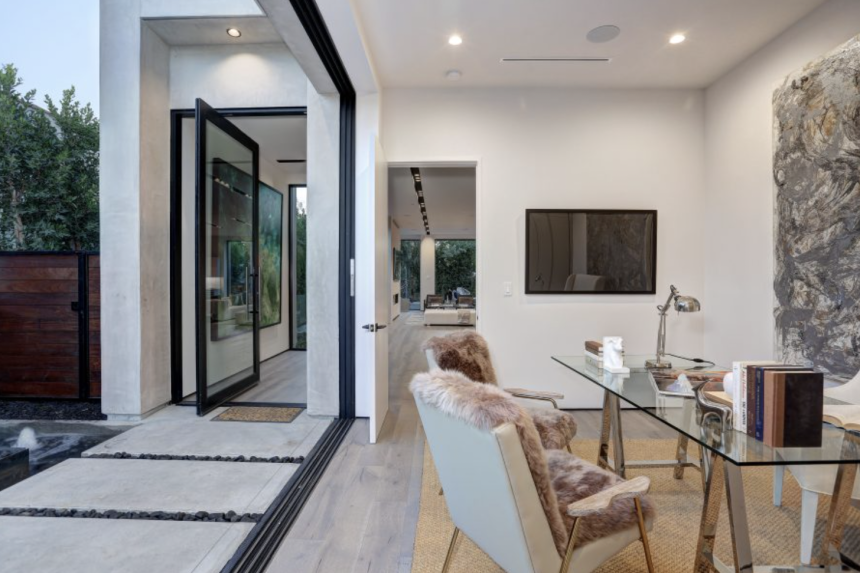Sure, a rumpus room is nice to have for entertaining. A built-in bar can add a certain distinguished flair to a house. And a home theater is impressive. But if you’re looking for the pinnacle in at-home luxury, you have to hand it to the cigar lounge.
A personal cigar lounge is all those things and more. It’s ideal for entertaining, adds a sophisticated element to your home, and comes dressed to impress. Plus, if you do it right, a cigar lounge can enhance the enjoyment of your cigar-smoking experience, preserve your cigar quality, and control ventilation.
In this article, let’s explore some guiding principles for creating your perfect at-home cigar lounge.
Choosing the Right Location for Privacy, Ventilation, and Space
First, select a spot for your lounge. Ideally, you want a spot that offers some privacy while still being accessible. Additionally, you need to align the size with your intended use; if you plan to host people, ensure you choose a space comfortable enough to seat a crowd.
If you choose a place indoors, consider ventilation and air quality. Choose a room with operable windows (preferably two) to maximize cross-flow for ventilation. Then, look into options like exhaust fans, air purifiers, and smoke-eating systems to contain or mitigate the presence of smoke elsewhere in the home.
Conversely, if you have a spouse or family member who isn’t keen on smoking indoors, you may choose a place outdoors. Ensure that your outdoor lounge has year-round solutions for the weather, like a firepit, outdoor heaters, and outdoor lighting systems. Create a natural barrier with trellises or hardscaping elements to increase privacy. And leave your humidor inside to shield it from temperature and humidity fluctuations.
Selecting the Perfect Seating
Seating is one of the most critical aspects of any good cigar lounge. Your seating should be comfortable enough for extended use, but never at the expense of refinement. (Sorry, bean bag chairs need not apply).
Antique and mid-century pieces fit particularly well with the classy, traditional ambience of a cigar lounge. Leather is a fantastic all-around choice for furniture upholstery; it evokes a rustic, time-worn feeling and doesn’t hold onto smoke like other textiles. Whatever seating you choose, leave enough room for personal side tables and coffee tables so guests can rest their drinks or ashtrays.
Incorporating Storage Solutions and Accessories
What makes this a cigar lounge and not – say – simply a lounge where one can smoke cigars? It’s all in the storage and accessories.
At a bare minimum, a cigar lounge needs a humidor. Tailor your humidor to the size of your collection, and choose something that fits the overall aesthetic of the space. For instance, if you have an antique hardwood motif going already, look for a well-crafted, inlaid hardwood humidor. If you want to learn more about how to make cigars last indoors, read the insightful resource linked to the left. Whatever humidor you choose, add a Boveda 2-way humidity control pack to control the relative humidity.
Next, consider a shelving cabinet or display case for essential items like cutters, lighters, and ashtrays. Add a drink station stocked with typical cigar pairings like whisky, Cognac, and aged rum. Integrate entertainment options like a sound system or a small library. For a more modern twist on the traditional cigar lounge, you can even add a TV.
Let There Be Light
Lastly, consider installing warm, inviting lighting. Ditch the white and blue lights, reaching instead for lights between 2700K and 3000K on the color temperature scale—this range has a natural, sunset-like warmth that works well in a lounge setting. Reinforce these warmer light hues with a color scheme that features rich, rustic palettes.
Creating the ultimate cigar lounge at home is about more than just design—it’s about crafting a space that embodies your passion, offers relaxation, and enhances the entire cigar-smoking experience. Follow the tips above to get started.
Lynn Martelli is an editor at Readability. She received her MFA in Creative Writing from Antioch University and has worked as an editor for over 10 years. Lynn has edited a wide variety of books, including fiction, non-fiction, memoirs, and more. In her free time, Lynn enjoys reading, writing, and spending time with her family and friends.















